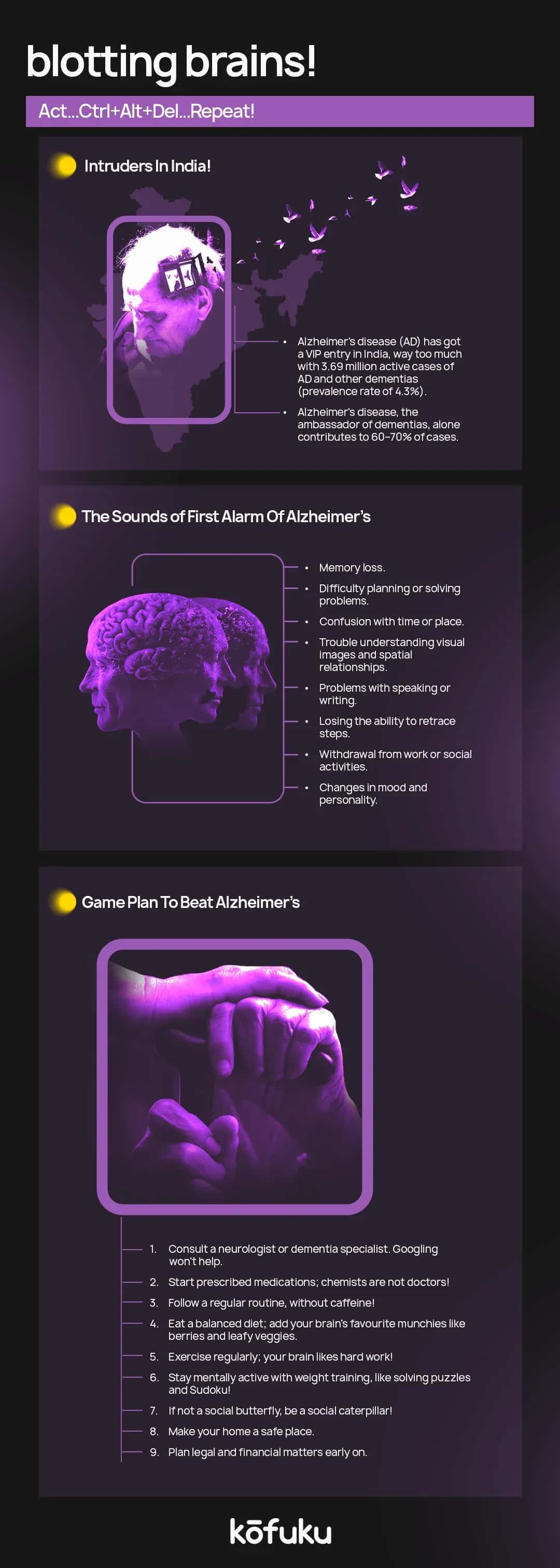Early Signs of Alzheimer’s Disease

Introduction
How would you feel if you stood in front of your own house and yet did not recognise it? The house you grew up in, the house you spent your entire life in. Do you feel a sudden clog in your throat? Now imagine that is the reality of 8.8 million people. People with dementia.
Alzheimer’s disease is one of the most common forms of dementia found in India. Older adults, typically people on the wrong side of 50, are the primary sufferers. When we start losing our memory, life goes haywire.
But not everything is bleak. Alzheimer’s comes with plenty of early warning signs, though. If you can spot them early in your life, you can actually take preventive measures. How to spot them? Read on!
What are the early signs of Alzheimer’s Disease?
Memory Loss
When Alzheimer’s strikes, the first casualty is memory, one of the most common signs, especially in the primary stages, can make you forget important information like dates or events, or keep on parroting the same questions constantly, and having to rely on memory aids or loved ones, for things that you used to handle previously alone.
Granted, people forget names or appointments, but they would recall them later. A lot of people, thanks to memory problems due to Alzheimer’s or dementia, can experience changes in their ability to develop and plan or work with numbers.
They might not remember a known recipe or even keep track of monthly bills. There could be concentration issues, taking much longer to do simple tasks and more.
Challenges with planning or with solving problems
Some people living with memory changes that happen because of Alzheimer’s or other sorts of dementia might experience changes in their ability to develop and go through with a plan, or work with numbers.
They might have issues following a familiar recipe or tracking monthly bills. There are concentration issues, and much more time is taken to do things than they could do before.
Planning completely goes out the window when Alzheimer’s strikes. This is because you have to remember the nuances of a plan, details like names or places, or even dates. Alzheimer’s is not going to let you do so. Better to note it down separately somewhere, lest you forget.
Issues with completing familiar tasks
With Alzheimer’s, the familiar becomes the unfamiliar, as memory changes strike, and you find it impossible to do everyday tasks. This could manifest in different ways. Some people might have trouble driving to a well-known destination, organising a grocery list, or even recalling the rules of a favourite game.
They might require help with simple stuff like using microwave settings or how to record their much-loved TV show. Favourite childhood story? Nope, no idea. As Alzheimer’s advances, the well-known becomes strange. Because of this a doctor’s visit is mandatory.
Getting confused with time and place
Suffering from Alzheimer’s disease? One common mishap is forgetting about the day of the week, and now knowing what it is, only to figure it out later. Confusion about time and place is quite commonplace with Alzheimer’s disease.
In fact, this is the pattern that the disease follows, before dementia sets in and you forget everything. Suddenly, you found yourself somewhere, but you have no clue how you got there. Blame Alzheimer's in the first place.
Issues with understanding visual images and spatial relationships
Certain people living and dealing with Alzheimer’s or some sort of dementia, on a daily basis, could experience vision changes.. It takes a certain amount of skill to identify visual imagery.
You need to be able to comprehend it and figure out what that picture is trying to tell you. Once Alzheimer’s strikes, comprehending visual information becomes next to impossible.
Spatial relationships suffer as well. Alzheimer’s takes no prisoners and leaves a long list of casualties in its wake.
Speaking, writing and more become impossible
Speaking, making notes, etc, becomes a challenge when one is suffering from Alzheimer’s disease. The disease, which is so famous for compromising memory, compromises a number of other things as well. They find it difficult to hold a pen and write down something legibly.
Work and social activities suffer
As Alzheimer’s takes over, people might find that they voluntarily withdraw from work or social activities. What’s the point when you can’t remember the little details?
They might find that they’re not able to keep up with a favourite team or an activity. This sort of loss of interest in something that they used to do earlier, and now they don’t care about who they might disappoint or hurt eventually as a result of their actions.
Personality and mood alterations
People living and dealing with Alzheimer’s or another sort of dementia on a daily basis might experience mood and personality changes.
Mood is a clear indication that something is wrong with someone and they’re not in their normal frame of mind. Alzheimer’s does that to people. It brings about alterations in their mood, so that their mind stops functioning normally.

Conclusion
Progressive and deadly in nature, Alzheimer’s is a complicated condition that deeply affects not just memory but every aspect of your everyday life. As of now, there is no cure.
So early detection is your best bet, as is supportive care, and lifestyle changes that can majorly impact quality of life for patients as well as caregivers.
By bringing about further awareness, bringing down stigma and fostering timely medical attention, we can assist those who are affected so that they might lead more dignified and meaningful lives.

FAQs
Q. What is the difference between Alzheimer’s disease and general memory loss due to ageing?
A. Alzheimer’s involves progressive memory loss that disrupts daily life, while age-related memory issues are typically minor.
Q. At what age do symptoms of Alzheimer’s typically begin to appear?
A. Most people with Alzheimer’s start showing symptoms in their mid-60s, but early-onset Alzheimer’s can begin as early as age 40–50.
Q. Can you prevent Alzheimer’s disease?
A. There is no guaranteed way to prevent Alzheimer’s, but healthy lifestyle choices such as regular exercise, a balanced diet, mental stimulation, and good sleep may lower the risk.
Q. Is there a cure for Alzheimer’s disease?
A. Currently, there is no cure, but treatments and medications are available.
Q. When should I see a doctor if I suspect Alzheimer’s in myself or a loved one?
A. If memory loss or behavioural changes interfere with daily life, it’s important to consult a doctor.


Is Anxiety A Hidden Risk Towards Dementia?

Can Traffic-Related Air Be an Unusual Link to Causing Dementia?

10 Warning Signs of Mental Health Struggles: When to Seek Help


